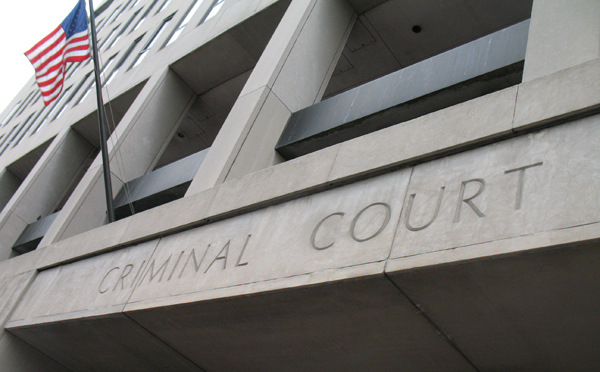“One concrete action—NY State Assembly Bill 2025-A767—would establish a Youth Justice Innovation Fund to make funds available to community-based organizations for services and programs with the purpose of preventing youth arrest and incarceration and promoting positive youth development.”
The Bronx Criminal Courthouse. Photo by Jarrett Murphy.
The vile, brutal beating death of 22-year-old Messiah Nantwi by officers at Mid-State Correctional Facility must catalyze a very different and courageous response, as opposed to the default response, which is more imprisonment in rhythm with election cycles.
Commonly, after a high-profile tragedy involving young people, there’s a default button which leads to knee-jerk justice system legislation and policy, with little attention paid to the long game of positive outcomes.
Often short-sighted and costly—with human and financial tolls—those defaults neither solve nor sustain the needs of justice and public safety, and are inadequate responses to trauma, pain, and loss.
Those default responses put young people in harm’s way through more imprisonment, fewer parole opportunities, and harsher sentences for adolescents. When New York and the nation promoted these approaches beginning in the 1970s, it led to the disproportionate mass incarceration of Black and brown young people. It would be 30 years before we sought to reverse those trends.
At age 16, Messiah Nantwi was a hopeful, soft-spoken, intelligent teenager who devoured books and had a sparkle in his eyes. He would come around and sit with his mentors at Youth Justice Network, a leading Harlem-based non-profit which breaks cycles of incarceration through individualized advocacy, mentorship, and youth development services.
Messiah would talk about how he wanted to travel the world, and he would ask his YJN mentors for books to read. At one point he would ask why “[a kid] had to get in trouble to be able to get this program.” He once told his YJN teacher that, “Where I live, it’s easier to get a gun than a book.”
At age 18, Messiah was arrested in a Bronx incident that started as a graffiti stop in which he was shot multiple times by police officers in the Bronx. As his case proceeded through the court system, he worked on his physical rehabilitation and recovery. He worked hard to do well and try to get his life back on the right track. With support from his YJN mentors, he took coding classes, was admitted to college and filled out his financial aid forms.
But by then the inequity in the justice system had done its job, and the joy in his eyes had faded, his mental health was severely compromised, and his pain was palpable. He ultimately pled guilty to criminal possession of a weapon and was sentenced to a five-year period of imprisonment that eventually brought him to Mid-State Correctional facility.
At age 22, instead of getting a college diploma, he was beaten to death on March 1, 2025 in a New York State prison by correction officers. At the time, Messiah was also awaiting trial, indicted for the shooting death of two people, one of whom was only 19.
We need to lift our communities and each other up by prioritizing young people’s safety and wellbeing through opportunity, access to support and services, and positive community networks.
One concrete action—NY State Assembly Bill 2025-A767—would establish a Youth Justice Innovation Fund to make funds available to community-based organizations for services and programs with the purpose of preventing youth arrest and incarceration and promoting positive youth development. If appropriated, it would fund violence prevention services, diversion, alternatives to detention, placement and incarceration, post-release support, and education and employment for young people up to the age of 25.
Young people grow, gain a voice and can realize their power only when they can feel safe, cared for, learn, play, and experience a world outside themselves. We as a society must commit to leverage their promise before it turns to pain they cannot return from—as it did for Messiah Nantwi.
Christine Pahigian is the executive director of the Youth Justice Network. Assemblywoman Michaelle C. Solages, is the deputy majority leader and chair of the New York State Black, Puerto Rican, Hispanic and Asian Legislative Caucus.
The post Opinion: Courageous Response Must Follow New York’s Latest Prison Death appeared first on City Limits.


Leave a Reply